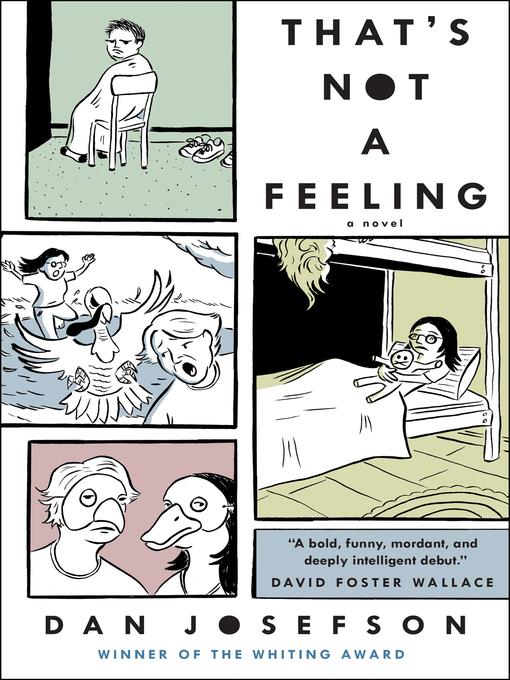
That's Not a Feeling
A Novel
فرمت کتاب
ebook
تاریخ انتشار
2012
Lexile Score
840
Reading Level
4-5
ATOS
5.6
Interest Level
9-12(UG)
نویسنده
DAN JOSEFSONناشر
Soho Pressشابک
9781616951894
کتاب های مرتبط
- اطلاعات
- نقد و بررسی
- دیدگاه کاربران
نقد و بررسی

August 6, 2012
Roaring Orchards, a boarding school in upstate New York for troubled teens, is the setting of Josefson’s debut novel, which is full of characters (both students and teachers), groups (Alternative Girls; Regular Kids), rules, and schedules. Josefson offers a map with every Roaring Orchards building labeled, a specific, defined (and confined) geography. He’s created a microcosm, led by the idiosyncratic headmaster Aubrey, a man with severe unspecified health and psychological problems who thrives on creating rules and bizarre special designations, and shepherds offbeat therapeutic activities like “psychic mending,” in which participants play a variety of individuals in a student’s life. Combine leader Aubrey with the rural microcosm and the feeling that those in charge are just as crazy as the individuals they’re in charge of, and it’s hard not to think of Animal Farm. Josefson writes with a similar ironic detachment to Orwell’s parable, but there’s no sense of authorial omniscience, just precise, detailed descriptions. Given the emotional issues of the students (and to a lesser extent the teachers), Josefson’s cool, measured prose at first comes as a surprise. But it soon becomes clear that the students—Lauren, who regularly cuts herself; Tidbit, who takes all varieties of dangerous drugs; sometimes narrator Benjamin, who has multiple suicide attempts in his past—are all emotionally disconnected from their inner turbulence and the style makes sense. A promising if not fully realized effort.

September 1, 2012
Most of the goings-on at Roaring Orchards School in upstate New York are not academic but instead personal and chaotic. Josefson uses Benjamin, a new student at the school, as an intermittent narrator, though he also narrates events he couldn't possibly have witnessed, so while we get his perspective on incidents at the school, we get a broader view as well. With two failed suicide attempts behind him, Benjamin has been placed in school by his parents, who drop him off and disappear--his first hint that life will start to be very different indeed. At Roaring Orchards he meets a plenitude of bent and broken students, most notably Tidbit, a buxom girl who's attracted to most every drug. The most normative response that students have to the school is running away, and it seems as if they're always being chased down and brought back against their will. The founder and headmaster of the school is Aubrey, who one day had an epiphany that students engaging in questionable behavior should not be expelled, and he found an eager cadre of parents who bought into this philosophy, for he was able to expand the school impressively after he put this policy into effect. Because it's a school for "troubled teens," Aubrey has instituted a number of strategies, many of them involving therapy but most of them questionable--like having students relive birth trauma, for example, or placing them in "alternative" dorms to isolate them for untoward behavior. We eventually find out that Benjamin is narrating these events of his adolescence from an adult perspective, and his visit to Roaring Orchards after Aubrey's death and the school's demise is particularly poignant. Josefson writes vigorously and is well attuned to the upheavals experienced by adolescents.
COPYRIGHT(2012) Kirkus Reviews, ALL RIGHTS RESERVED.

Starred review from July 1, 2012
This remarkable first novel focuses on an autumn spent by 16-year-old Benjamin at an unorthodox upstate New York school for troubled teens. Suddenly on his own, Benjamin has to learn quickly to navigate the unfamiliar environment of the school. Aubrey, the headmaster, preaches a philosophy of taking responsibility, but exactly what this means and how it is to be implemented is as much a mystery to the teachers as to the students. Both groups are mostly biding their time and making do in a difficult and unpredictable environment, an environment held together mostly by the sheer force of Aubrey's personality. But when Aubrey is diagnosed with cancer things begin to change. Meanwhile, Ben finds an ally in Tidbit, an equally troubled young woman, and they make plans to run away. VERDICT Funny at times, and more than a little sad, the book's form perfectly mirrors Benjamin's profound sense of dislocation and uncertainty. This is a powerful, haunting look at the alternate universe of an unusual therapeutic community.--Lawrence Rungren, Merrimack Valley Lib. Consortium, North Andover, MA
Copyright 2012 Library Journal, LLC Used with permission.

Starred review from September 15, 2012
The Roaring Orchards School for Troubled Teens in upstate New York is a troubled institution. Its founder and headmaster, Aubrey, resembles a cult leader, and while he insists that teens need structure and limits, interpreting his rules isn't easy; the struggle to win privileges often pits the students against one another. Anchored by the slowly growing friendship between students Benjamin and Tidbit (aka Sarah), the story is told by Benjamin, in recollection, informed by what he says others told him, so it becomes both a first-person narrative and an ensemble piece (there are many scenes in which Benjamin is not present). This is not your usual coming-of-age tale. Aubrey's arcane, arbitrary form of therapy (the book's title comes from his list of seven approved feelings) and its attendant vocabulary evoke George Saunders' eye for the absurdity of bureaucracy and his ear for jargon, too. There are also strong echoes of Ken Kesey's One Flew over the Cuckoo's Nest. But despite the dark humor, Josefson humanizes his characters beautifully. Their longing to connect, and their confusion at where they find themselvesstudents and faculty alikeis urgently palpable. The prose is matter-of-fact, even placid, and studded with perfectly phrased gems, a cool surface to a work that is rich in feeling. A wonderful and noteworthy debut.(Reprinted with permission of Booklist, copyright 2012, American Library Association.)

























دیدگاه کاربران